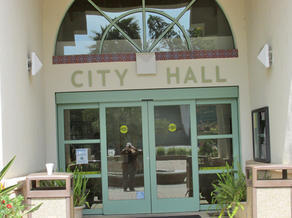Catalina Island Health recently asked the City Council to approve a non-binding letter of interest for a potential $2.8 million advance from the Avalon General Fund.
The council considered the and unanimously approved the on March 18.
The money would go into a state program that would receive matching federal funds that would go back to Avalon’s hospital.
If approved by the state, city staff would come back to the council with a final proposal at a later date for approval before the city actually provided the money.
According to the city attorney, funds for building a new hospital can’t be used for this proposal.
Discussion
The following is not a transcript but a look at the highlights of the discussion.
According to City Manager David Maestros, the purpose of the request was for Catalina Island Medical Center to participate in a program to increase funding for the hospital. CIMC is currently called Catalina Island Health, but the staff report referred to CIMC.
“This is part of a this is a request from the hospital for an advanced payment of $2,800,000 so that the hospital can use this for a program that the state and federal government has where they receive matching funds,” said Avalon City Attorney Scott Campbell.
Leanne Habte, head of health care practice at BBK, explained the program to the council.
Campbell said this was not a final decision today. He said there was still some legal and financial analysis to be done.
“Whatever deal the city would propose has to be approved by the state,” Campbell said.
According to Campbell, if the state doesn’t approve the proposal, even if the city and the hospital want it, the project won’t go forward.
Habte, participating remotely, said there were restrictions on the types of funds that may be used to support inter-governmental transfers of funds.
She said there would be a transfer of funds to the state that would allow California to increase payments under medical managed care plans. “It would allow the state to draw down additional federal match funds for those increased rates,” Habte said.
She said it does not allow the hospital to send those dollars back to the city directly.
She said there would have to be other sources of revenue or in the case the money would have to come from Measure C funds to allow Avalon to recoup them.
According to Campbell, the hospital would pay the state $2.8 million and the federal government would match those funds and send more money back to the hospital.
“But once they have those dollars, they can’t use those dollars to pay back the city,” Campbell said.
“So we need another source,” Campbell said.
He said Catalina Island Health was proposing to use Measure C funds, about $700,000 to $800,000 a year. “Over the course of a couple of years, those funds would be used to repay this advance if the council’s interested,” Campbell said.
He said this was unusual because the hospital is not a governmental entity, it’s a private charitable corporation. “So that’s one hurdler, the state has to approve this,” Campbell said.
He said Avalon would have to be comfortable with a number of factors that the city would get this money back.
He said staff would come back to the city probably in July or August.
He said if everything worked out, the funds would be provided in late fall or December.
In response to a question from Councilmember Yesenia De La Rosa, Campbell explained that the money goes to LA Care, which he called the MediCal agency for the program, then they work with the federal government, and they would pay the hospital.
De La Rosa wanted to know who would have the financial oversite.
Campbell said that was part of the regulatory agreement between the hospital and LA Care. He said one of the terms of the agreement is that the city would be able to participate in those discussions and the financial oversite.
Campbell said that in addition to the state, Avalon Finance Director Matt Baker would be watching.
Mayor Anni Marshall asked what was the intent of Measure C.
Campbell said Measure C was a sales tax to supplement hospital funds.
According to Campbell, Measure M funds could only be used for the construction of a new hospital. “They cannot be used for everyday expenses,” Campbell said.
Marshall asked if the money could be used for just patient care and not administration, referring to part of the proposed agreement.
Habte said she did not believe the state specified that type of requirement.
Marshall asked what happened if the proposal did not go through?
Campbell said that was a question for the hospital.
Habte said if the state did not approve the proposal, there would be no agreement between Avalon and California.
“My big alarm bell is that on Friday it was reported that Gov. Newsom dragged $3.4 billion from the state’s General Fund to fund MediCal because the current federal administration is defunding social services,” said Councilmember Mary Schickling.
She called the proposal “a huge gamble”.
Councilmember Lisa Lavelle said if the agreement was not approved by the state or the federal government, then Avalon wouldn’t lose the money.
Campbell said Avalon was not paying the money until the council approves it, until legal approves it, and until the state approves it.
Campbell said there was a deadline for the hospital to apply for the program, which was the end of March.
A spokesman for the hospital who did not say his name came up to the podium and said they would not be coming here asking the council for a loan. He described it as putting up money that the hospital was losing for MediCal.
Campbell said the money could come from Measure C or any other source of revenue. “The hospital is operating at a loss right now,” he said.
The spokesman said the hospital is simultaneously pursuing several permanent solutions for the hospital funding.
According to Lavelle, a large part of the community was concerned about the money being paid back.
Lavelle expressed concern about the money being paid back. Said the administrative fee for the proposal was slightly higher than the interest income Avalon would earn from the money.
Campbell said the city was not losing money.
Lavelle agreed there should be city oversight on this moving forward.
“I appreciate that the hospital is looking at a variety of solutions,” Lavelle said.
Schickling asked if Avalon would have to put up the $2.8 million in a lump sum right now.
Campbell said no. He said he thought it was two payments in the fall and early winter.
“What if there’s a disaster,” Schickling asked.
“How comfortable would the city be if we just forked out $2.8 million and then something horrible happened and we don’t have any money?” Schickling asked.
“None of us can predict the future,” said Finance Director Baker said.
He said the city had an unassigned fund balance of around $16 million.
He said the city would still have well over $10 million.
One member of the public wanted to know if Avalon had financial oversight of the hospital.
Campbell said that under the proposal, there would be an agreement that would prohibit the sale of the hospital or change of ownership without the city’s approval. There would also be financial reporting requirements including audits and monthly or quarterly statements.
“Considerably more oversight than we have right now,” Campbell said.
Bri Broussard said she was at the council last year when the hospital said they were in financial turmoil and she remembered Marshall asking for the hospital to come back and talk about Measure H funds. “I don’t believe that meeting has happened,” she said.
She said she would also like to see transparency.
City Manager David Maestros said the city did engage partners to review every request that comes in from the hospital for Measure H funds.
Dave Thompson asked where the $2.8 million would be coming from.
Campbell said the city has a General Fund of $16 million that he described as a kind of reserve.
Thompson asked about interest.
“Yes, we do, we get 5% back,” Campbell said. He said that was more than the city gets back through investments.
Campbell explained that the federal government will give back matching funds.
Thompson asked if anyone could attend the hospital board meetings. He was told they were private.
“The board is the one that’s in control. I don’t know why we don’t hear from the board or get reports from the board,” Thompson said.
De La Rosa asked if that was something the city could look into.
“We certainly can have those conversations with the hospital,” Maestros said.
“Love Catalina, they’re a nonprofit as well. Can anybody go to their board meetings?” Marshall asked.
Maestros said yes. He pointed out that Love Catalina gets TOT money.
“You could make it a condition of the advance,” Campbell said.
“Ultimately, we come back to the city with the final agreement,” Campbell said.
Marshall told Thompson that he could look up the names of the hospital board members the hospital website and approach them as individuals as well.











